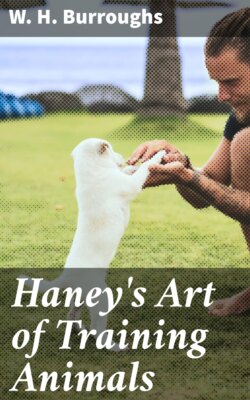Читать книгу Haney's Art of Training Animals - W. H. Burroughs - Страница 6
На сайте Литреса книга снята с продажи.
CHAPTER II.
HORSE TAMING AND HORSE TRAINING—HORSE MANAGEMENT—WHIP TRAINING—CURING BAD HABITS, ETC.
ОглавлениеTable of Contents
Some few persons imagine that to possess a proper mastery over their horses, they must maintain their authority by brute force. This is a great mistake. More work, within the limit of safety, can be got out of a horse by kindness than by cruelty, and as far as managing a horse is concerned the chief point is to teach him confidence in you. If he believes you to be his friend he will not only strive to please you, but will have less fear of strange objects which otherwise might startle him and render him refractory.
The Rareys—there are two or three of them—taught the world a most important lesson when they taught it the “power of kindness” and “self-control” in the management of horses, donkeys, zebras, and other animals. How often do we see inconsiderate parents fly into a passion and, without reason or religion, thrash the object of their displeasure. So of brutal, heartless drivers, when the “blinded” horses chance to misstep, get off the track, stumble, or in the wrong place. By their actions it would appear that they expected a horse or an ass to reason quite as well as themselves. Employers may not look for the same talent in their apprentices as in their foreman. Teachers may expect every little urchin to be self-regulating and to mind his books; but this it is his duty to teach him to do, and he should be all patience, all kindness, affection, perseverance, if he would produce the best results. The same spirit is required to subdue and manage a horse. If you say you are not equal to the task; if you say your child, your horse, or your ox knows more than you, is your master, then you are not the one to manage him, and you should resign in favor of one who is superior to child, horse, or ox. A weak man in intellect may indeed be outwitted by a sagacious child or horse.
There is no disguising the fact that viciousness is innate with some horses. But far more so with some, nay, most, men, from whom they get it. It is no doubt sometimes hereditary, and follows some of the best strains of blood we have. That viciousness should accompany a highly nervous organization is not to be wondered at. Hence it causes no surprise when we find such dispositions among the finely organized thoroughbreds—animals of a most sensitive and nervous organization—from which the common expression “thin skinned,” as applied to a too sensitive man, is obviously derived. The treatment horses receive, and the moral atmosphere in which they are thrown, have a much greater influence than most horsemen are generally inclined to admit. The pinching, tickling, rough, boisterous stable boy who annoys a spirited horse for the sake of enjoying his futile, though almost frantic kicks and leers, is affecting the disposition of the horse and his descendants for generations to come, besides putting in jeopardy the lives and limbs of those who are brought in contact with the horse so tampered with. A horse is surely influenced by the character of the men with whom he associates.
Sometimes, however, it is necessary to conquer a bad tempered horse, and if possible to secure a radical conversion or change of character which shall be lasting. No timorous man need undertake this task; he will only make matters worse. A horse tamer should be calm, cool, brave, and fearless—the horse will know it; he should be quiet, for then the horse will be put off his guard; he should be firm and give the brute no advantage, but crowd him up to doing something, and that, invariably, what the tamer wants him to do. Thus any ordinary horse will soon give up and own man his master. The kindest treatment and even petting must always follow yielding; and if possible to help it, the horse should never be frightened by any treatment, and above all things he should never be angered by petty torture. His own contrariness should appear to him to be the cause of all his trouble, and man his best friend. This principle is at the foundation of Rarey’s successful practice.
